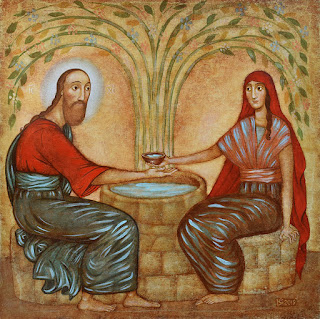1st Johnstide
Mark
1:1-13
This is the beginning of the new word from the realm of the angels, sounding forth through Jesus Christ. Fulfilled is the word of the prophet Isaiah:
Behold,
I send my angel before your face.
He
is to prepare your way.
Hear
the voice of one calling in the loneliness of the human soul
Prepare
the way for the Lord within the soul,
Make
his paths straight, so that he may find entrance into the innermost human being!
John wore a garment of camel’s hair and a leather belt around his waist. Fruits and wild honey were his food. And he proclaimed:
‘After me comes one who is mightier than I. I am not even worthy to bend down before Him and to undo the straps of His sandals. I have baptized you with water,
but He will baptize you with the fire of the Holy [healing] Spirit.’And at the same time, as he rose up again out of the water, he beheld how the spheres of the heavens were torn open, and the spirit of God descended upon him like a dove.
And a voice sounded from the world of the spirit:
‘You are my son, the beloved - in you is my revelation.’ [‘Today I have conceived (begotten) you.’ Luke 3:22]
St. Johnstide
June 28, 2020
Mark 1: 1-11
As we grow older, our awareness expands. Imagine going back in time to visit our younger self. Imagine what we would want to say to that younger self out of our years of experience since our youth. Imagine how possibly painful our older self-awareness would be in the face of our former innocent intentions. And imagine how terrified our younger self would be to encounter this someone from the future who is so strangely familiar, who so intimately knows us.
John the Baptist is humankind’s older self. He is the older self who has gone ahead of us. He has something he wants to say to us. He is acutely aware of his own and humankind’s failings. Out of his broader awareness, he encourages us to change our way of thinking, to undergo a change of heart. This is all in preparation for an encounter with Christ Jesus, the innocent younger self of humankind.
John encounters the innocence of Jesus,
and the enormity of the spirit of God that descends upon Jesus like a dove. The result for this older self of John is a deepening of humility. ‘I am not worthy’, he says. I am doing my best to serve what God has as intention for humankind. But HE is the embodiment of the pure and grand intentions of the Godhead. He is the true prototype. And thus He is even before me. He is my own younger self as God intended me to be.We can experience painful self-awareness of our shortcomings, our failures to be what both God and we intended to be; and at the same time, this is a deep experience of God’s love for us, His willingness to sacrifice Himself for us, so that we can start over, begin again to be what we, and He intended us to be.
We shy away from such encounters; such painful self-awareness terrifies us; and to be so intimately known can be devastating. But it is a necessary step on the way to experiencing the mildness, the acceptance, the calm radiant forgiveness of the One who is our ideal future self. Such self-awareness is a necessary passage into the forgiveness that allows us to start over, to begin at the beginning again. It is the experience of what the poet Juan Ramon Jimenez speaks of when he says:
I am not I.
I am this one walking beside me whom I do not see,
Whom at times I manage to visit,
And whom at other times I
forget;
The one who remains silent when
I talk
The one who forgives, sweet,
when I hate,
The one who takes a walk where I
am not.
The one who will remain standing
when I die.*
* “I Am Not I”, by Juan Ramón Jiménez, in Risking Everything, ed. By Roger Housden, p. 19.













